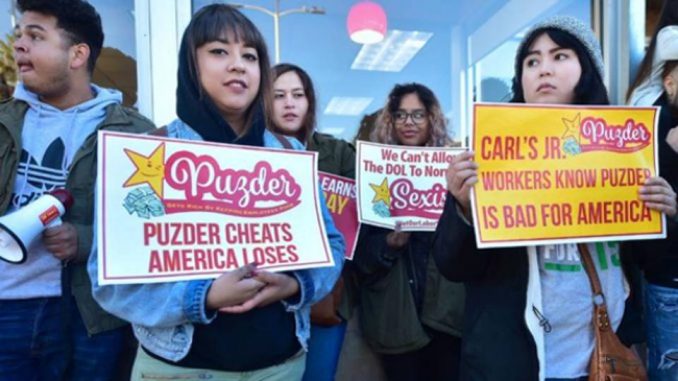On the picket line
Uber: lies about driver earnings, attempts to break strike
Uber Technologies agreed Jan. 19 to pay out $20 million to settle claims that the online ride-sharing platform lied about how much drivers could earn. Uber offers on-demand taxi service at lower rates than traditional cab companies by dumping the extra costs on its “independent contractor” drivers.
According to the Federal Trade Commission, Uber’s advertisements promised drivers unrealistic earnings in 19 cities and counties. In New York and San Francisco, less than 10 percent of drivers reached advertised income levels, while actual incomes were on average nearly one-third lower. Uber’s car-financing programs also ended up costing drivers more than advertised, according to the complaint. (phillytrib.com, Jan. 24)
But Uber’s contempt for workers goes far beyond the way it advertises for prospective drivers. The N.Y. Taxi Workers Alliance, mostly immigrants from Southwest Asia, called a one-hour strike at JFK International Airport on Jan. 28 to protest the detainment and deportation of Muslims traveling to the U.S. Rather than extending solidarity, Uber announced lower-than-normal rates for travelers to and from the airport, apparently in an attempt to break the strike.
Even before that, Uber CEO Travis Kalanick had joined Trump’s economic advisory council, the Strategic and Policy Forum, to help carry out the racist billionaire’s war on workers and the oppressed. After thousands joined calls to #BoycottUber, however, Kalanick announced Feb. 2 that he would step down from that post. Kalanick got the message loud and clear: He’d better not use racism to promote Uber, or he’ll get mass resistance! (arstechnica.com, Feb. 3)
 Workers file 33 complaints against Puzder
Workers file 33 complaints against Puzder
Restaurant workers filed 33 complaints on Jan. 25 and Jan. 26 against Carl’s Jr. and Hardee’s franchisees owned by Andy Puzder, CEO of CKE Restaurants Inc. and Trump’s nominee for labor secretary. The complaints charged wage theft with state departments of labor, sexual harassment with the U.S. Equal Employment Opportunity Commission and unfair labor practice charges with the National Labor Relations Board. (nrn.com, Jan. 26)
Millionaire Puzder opposes basic workers’ rights — a living wage, paid sick leave and overtime, safe working conditions and benefits like health care and pensions — for some of the lowest paid U.S. workers, mostly women and people of color. No wonder restaurant worker and activist groups have mobilized nationwide against him. (Workers World, Jan. 19) After coast-to-coast protests on Jan. 12, Fight for $15 organizers held protests on Jan. 26 at quick-service restaurants in 31 cities, from Los Angeles to St. Paul, Minn.
Raleigh, N.C., raises living wage
The Raleigh, N.C., City Council voted Jan. 17 to adopt a universal living wage. The measure will boost pay nearly 15 percent for the lowest-level, full-time city workers. Now all city workers will make at least $13.76 an hour by the next fiscal year. The measure is expected to cost the city an additional $500,000 annually for 215 security guards, mechanics and customer service reps. The measure makes Raleigh the tenth city in North Carolina to adopt a living wage measure. (Raleigh News & Observer, Jan. 17)
D.C. workers battle wage theft and win
Nearly two dozen mostly Latinx construction workers, hired by Genesis, a Washington, D.C., subcontractor, to build three large highrises in a mixed-use development, were owed tens of thousands of dollars in back wages. While work proceeded last fall, workers started receiving partial payments or had paychecks bounce; eventually, Genesis stopped paying wages entirely. So the workers quit and demanded payment, but Genesis stonewalled and general contractor Manganaro Midatlantic refused to accept responsibility for the stolen wages.
The workers turned to Trabajadores Unidos de Washington, D.C. The local advocacy group was able to use the District of Columbia’s 2014 Wage Theft Prevention Act, which holds both contractors and subcontractors liable. According to Arturo Griffiths, TUWDC executive director, the twenty-three Genesis workers were each owed more than $46,000 in back pay. Manganaro finally paid them on Dec. 8, two months after their first complaint. “This case is an important lesson for all DC workers,” says Griffiths. “[It shows] how important it is for … workers to understand the new law.” And why all cities not only need laws to stop rampant wage theft, but also workers’ organizations and unions to enforce them. (dclabor.org, Jan. 25)

